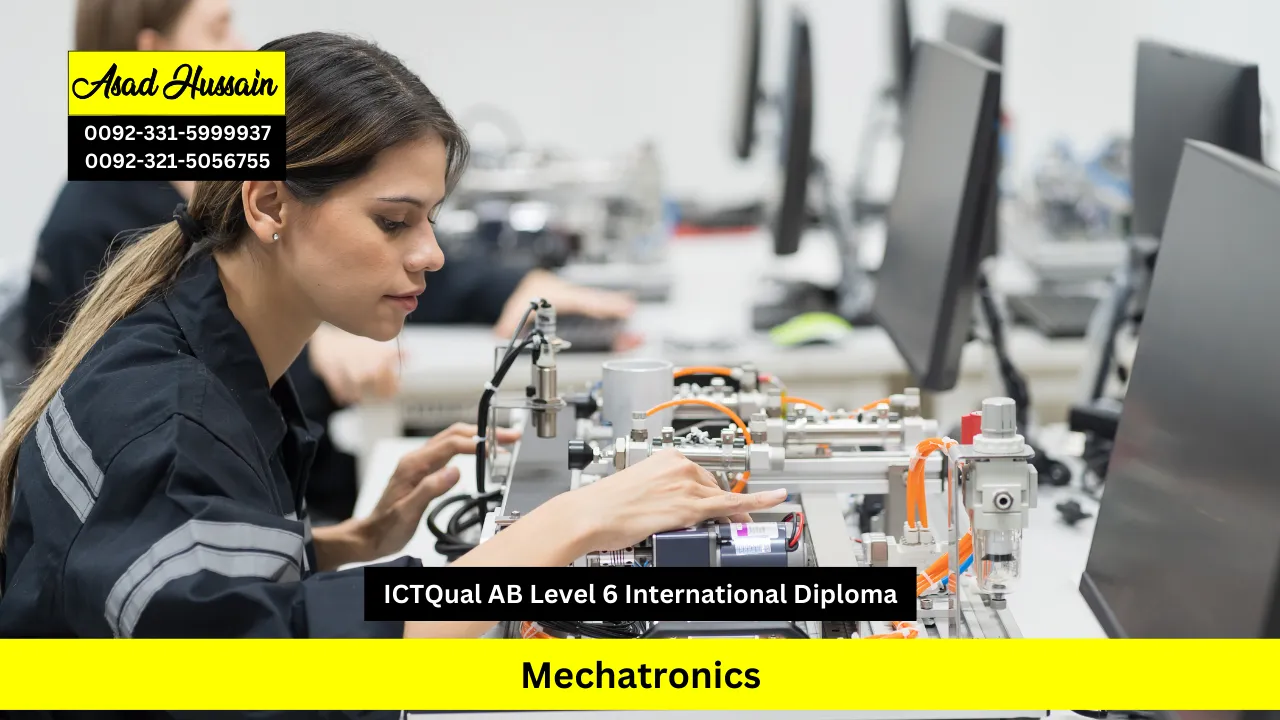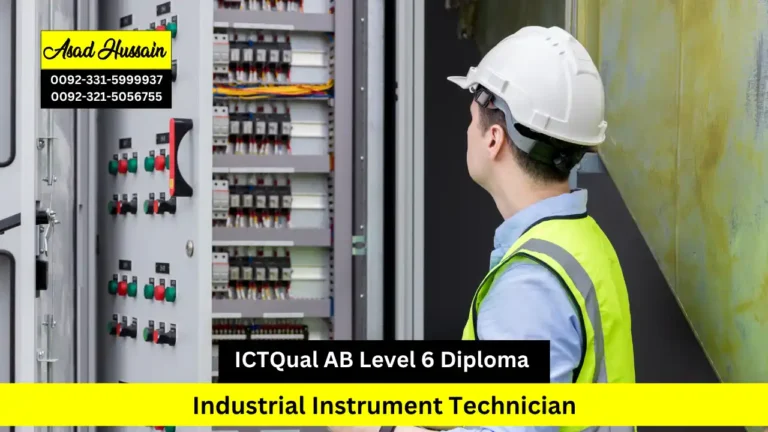The ICTQual AB Level 6 International Diploma in Mechatronics is a globally recognized program designed to equip learners with the advanced skills, knowledge, and practical expertise required in the interdisciplinary field of mechatronics, combining mechanical engineering, electronics, control systems, and robotics. As modern industries increasingly rely on automation, intelligent systems, and smart technologies, the demand for qualified mechatronics professionals has grown exponentially, making this qualification highly relevant for both freshers and experienced professionals.
ICTQual AB Level 6 International Diploma in Mechatronics, carrying 360 credits, provides a strong foundation in mechanical design, electronics, automation, robotics, and industrial control systems, while also covering critical aspects of system integration, troubleshooting, and maintenance. Learners develop practical, hands-on experience with state-of-the-art technologies, enabling them to design, operate, and maintain advanced automated systems effectively.
Through ICTQual AB Level 6 International Diploma in Mechatronics, learners gain expertise in problem-solving, system analysis, programming, and real-time control applications, preparing them to work in sectors such as manufacturing, robotics, automation, automotive engineering, and industrial process management. The ICTQual AB Level 6 International Diploma in Mechatronics also emphasizes teamwork, project management, and innovation, ensuring graduates are capable of leading technical projects and contributing to the development of cutting-edge solutions.
By completing the ICTQual AB Level 6 International Diploma in Mechatronics, learners are well-positioned to pursue rewarding careers as mechatronics engineers, automation specialists, robotics technicians, or further advanced studies in engineering and applied technologies. ICTQual AB Level 6 International Diploma in Mechatronics empowers individuals to meet the evolving needs of the global engineering industry and drive technological innovation in their respective fields.
Program Highlights
Study Units
This qualification, the ICTQual AB Level 6 International Diploma in Mechatronics, consists of 36 mandatory units.
Year 1 – Foundation in Mechatronics
- Principles of Mechanical Engineering
- Fundamentals of Electrical and Electronic Engineering
- Engineering Mathematics
- Introduction to Computer Programming
- Materials Science and Engineering
- Engineering Drawing and CAD
- Basics of Control Systems
- Digital Logic and Microprocessors
- Sensors and Instrumentation
- Fundamentals of Robotics
- Health, Safety and Environmental Practices in Engineering
- Communication and Technical Report Writing
Year 2 – Intermediate Studies in Mechatronics
- Advanced Electrical and Electronic Systems
- Applied Thermodynamics and Fluid Mechanics
- Microcontrollers and Embedded Systems
- Automation and PLC Programming
- Mechanical Design and Manufacturing Processes
- Dynamics and Vibration Analysis
- Power Electronics and Drives
- Robotics Systems and Applications
- Mechatronic System Design
- Data Acquisition and Signal Processing
- Industrial Maintenance and Reliability Engineering
- Project Planning and Management in Engineering
Year 3 – Advanced Studies in Mechatronics
- Intelligent Systems and Artificial Intelligence in Engineering
- Advanced Control Engineering
- Robotics and Autonomous Systems
- Smart Manufacturing and Industry 4.0
- Renewable Energy Systems and Applications
- Advanced Computer-Aided Design and Simulation
- Cyber-Physical Systems and IoT in Engineering
- Advanced Mechatronic System Integration
- Engineering Research Methods
- Professional Ethics and Sustainability in Engineering
- Innovation and Entrepreneurship in Technology
- Final Year Major Project (Capstone Project)
The ICTQual AB Level 6 International Diploma in Mechatronics is designed for individuals seeking to build advanced expertise in mechanical, electrical, and automation systems. To ensure learners are well-prepared for the program, specific entry requirements are outlined below. This course is suitable for both freshers and experienced professionals aiming to develop high-level technical skills in mechatronics.
Age Requirements
- Learners must be at least 18 years of age to enroll in this program.
Educational Requirements
- Completion of a Level 5 qualification or equivalent in Engineering, Electronics, Mechanical Technology, or related technical disciplines.
- Applicants with strong academic performance in Mathematics, Physics, or technical subjects at secondary or post-secondary levels are encouraged to apply.
Professional Experience
- For experienced candidates: A minimum of 6 years of verifiable work experience in mechanical engineering, electronics, automation, robotics, or related technical fields can be considered for accelerated assessment.
- Fresh candidates are required to complete all 36 assignments as part of the full three-year program.
English Language Proficiency
- Learners must demonstrate proficiency in English, equivalent to IELTS 5.5 or above, or provide evidence of prior education in English.
These entry requirements ensure that learners have the foundational knowledge and skills to successfully engage with advanced mechatronics concepts, hands-on projects, and technical problem-solving. Meeting these standards allows candidates to maximize their learning potential and excel in the field of mechatronics engineering.
The ICTQual AB Level 6 International Diploma in Mechatronics equips learners with advanced knowledge, technical skills, and practical expertise required to excel in the interdisciplinary field of mechatronics. Upon completion, learners will have the ability to design, operate, and maintain integrated mechanical, electrical, and control systems while applying critical thinking and innovative problem-solving in real-world industrial contexts.
Year 1 – Foundation in Mechatronics
Principles of Mechanical Engineering
- Understand core mechanical engineering concepts and principles.
- Apply fundamental mechanics to analyze forces, stress, and motion.
- Solve engineering problems using practical mechanical applications.
Fundamentals of Electrical and Electronic Engineering
- Gain knowledge of basic electrical circuits, components, and systems.
- Develop skills in measuring and analyzing electrical quantities.
- Apply electrical principles in simple engineering projects.
Engineering Mathematics
- Master mathematical methods for engineering problem-solving.
- Apply calculus, linear algebra, and differential equations in technical contexts.
- Develop analytical reasoning for modeling engineering systems.
Introduction to Computer Programming
- Learn basic programming languages and coding techniques.
- Apply programming to control simple engineering systems.
- Develop logical thinking for automation and system design.
Materials Science and Engineering
- Understand properties, structures, and selection of engineering materials.
- Evaluate materials for mechanical, thermal, and electrical applications.
- Apply material science principles in design and manufacturing.
Engineering Drawing and CAD
- Develop technical drawing and computer-aided design (CAD) skills.
- Create accurate engineering diagrams and 3D models.
- Interpret engineering schematics for system design and assembly.
Basics of Control Systems
- Understand principles of open-loop and closed-loop control.
- Analyze simple control system responses and stability.
- Apply control concepts in practical mechatronic setups.
Digital Logic and Microprocessors
- Comprehend digital logic principles and Boolean algebra.
- Design simple logic circuits and interface microprocessors.
- Apply digital electronics knowledge in automation systems.
Sensors and Instrumentation
- Identify and operate various engineering sensors.
- Measure physical quantities and convert them to electrical signals.
- Implement sensor data for system monitoring and control.
Fundamentals of Robotics
- Understand robot types, configurations, and kinematics.
- Apply basic programming for robotic motion and control.
- Analyze robotic systems in industrial applications.
Health, Safety and Environmental Practices in Engineering
- Recognize safety standards in engineering environments.
- Apply risk assessment and hazard mitigation techniques.
- Promote sustainable engineering practices.
Communication and Technical Report Writing
- Develop effective technical writing and reporting skills.
- Present engineering information clearly and concisely.
- Enhance communication skills for professional engineering contexts.
Year 2 – Intermediate Studies in Mechatronics
Advanced Electrical and Electronic Systems
- Analyze complex electrical and electronic circuits.
- Apply knowledge to design and troubleshoot systems.
- Implement advanced electronic components in practical projects.
Applied Thermodynamics and Fluid Mechanics
- Understand thermodynamic laws and fluid flow principles.
- Solve real-world engineering problems using thermodynamic models.
- Apply heat transfer and fluid mechanics in mechanical systems.
Microcontrollers and Embedded Systems
- Program and interface microcontrollers for automated control.
- Integrate sensors and actuators in embedded systems.
- Develop practical embedded solutions for mechatronic applications.
Automation and PLC Programming
- Understand programmable logic controllers (PLCs) and ladder logic.
- Develop automation routines for industrial processes.
- Test and troubleshoot PLC-based systems.
Mechanical Design and Manufacturing Processes
- Apply design principles in mechanical component development.
- Understand machining, forming, and additive manufacturing methods.
- Evaluate manufacturability and efficiency in production.
Dynamics and Vibration Analysis
- Analyze mechanical motion and dynamic behavior of systems.
- Evaluate vibrations and their impact on machinery performance.
- Apply solutions to reduce mechanical vibrations in equipment.
Power Electronics and Drives
- Understand principles of power electronics devices and circuits.
- Apply motor control and drive systems in automation.
- Integrate drives into mechatronic systems for practical applications.
Robotics Systems and Applications
- Design and program robotic subsystems for industrial tasks.
- Implement control algorithms for robotic motion.
- Evaluate efficiency and performance of robotic solutions.
Mechatronic System Design
- Integrate mechanical, electrical, and control components.
- Develop functional mechatronic prototypes.
- Apply system-level thinking in design and troubleshooting.
Data Acquisition and Signal Processing
- Capture and analyze engineering data from sensors.
- Apply signal processing techniques for system monitoring.
- Utilize data to optimize performance and decision-making.
Industrial Maintenance and Reliability Engineering
- Apply predictive and preventive maintenance strategies.
- Assess equipment reliability and lifecycle management.
- Develop plans for sustaining operational efficiency.
Project Planning and Management in Engineering
- Understand engineering project life cycles and methodologies.
- Develop project plans, schedules, and budgets.
- Apply team and resource management skills in practical projects.
Year 3 – Advanced Studies in Mechatronics
Intelligent Systems and Artificial Intelligence in Engineering
- Apply AI techniques in control and automation systems.
- Develop intelligent solutions for complex engineering problems.
- Integrate machine learning with mechatronic applications.
Advanced Control Engineering
- Design advanced feedback and control systems.
- Analyze stability and performance of control systems.
- Implement control strategies in practical industrial setups.
Robotics and Autonomous Systems
- Develop autonomous robotic applications.
- Integrate navigation, sensing, and decision-making capabilities.
- Evaluate robotic system performance in real-world scenarios.
Smart Manufacturing and Industry 4.0
- Understand smart factory concepts and cyber-physical systems.
- Apply automation, IoT, and digital twin technologies.
- Optimize manufacturing processes using advanced technologies.
Renewable Energy Systems and Applications
- Analyze renewable energy sources and integration methods.
- Design and implement sustainable energy systems.
- Evaluate energy efficiency in mechatronic applications.
Advanced Computer-Aided Design and Simulation
- Use advanced CAD tools for complex system modeling.
- Simulate mechanical, electrical, and control systems.
- Optimize designs for performance and manufacturability.
Cyber-Physical Systems and IoT in Engineering
- Integrate IoT devices with mechanical and electronic systems.
- Develop cyber-physical system architectures.
- Apply IoT for real-time monitoring and control.
Advanced Mechatronic System Integration
- Combine mechanical, electronic, and software components.
- Design and implement fully integrated mechatronic systems.
- Test and troubleshoot system-level interactions.
Engineering Research Methods
- Apply scientific methods in engineering investigations.
- Develop technical reports based on experimental data.
- Evaluate findings to inform design improvements.
Professional Ethics and Sustainability in Engineering
- Understand ethical responsibilities in engineering practice.
- Promote sustainable and socially responsible engineering solutions.
- Apply ethical principles in decision-making processes.
Innovation and Entrepreneurship in Technology
- Develop innovative solutions for engineering challenges.
- Create business and commercialization plans for technology projects.
- Apply entrepreneurial thinking to technological development.
Final Year Major Project (Capstone Project)
- Plan and execute a comprehensive mechatronic project.
- Integrate theoretical knowledge with practical design and implementation.
- Present, document, and defend project outcomes professionally.
Upon completion of this program, learners are fully prepared to pursue careers as mechatronics engineers, automation specialists, robotics technicians, or system designers. They will possess the technical expertise, analytical skills, and professional competencies needed to contribute effectively to industrial, manufacturing, and research environments worldwide.
The ICTQual AB Level 6 International Diploma in Mechatronics is designed for individuals who aspire to excel in mechanical, electrical, and automation engineering. Ideal learners are motivated to apply technical knowledge, problem-solving skills, and innovative thinking in practical industrial and research contexts.
Aspiring Engineers
- Seeking a strong foundation in mechatronics and automation systems
- Interested in developing practical engineering and technical skills
Career Professionals
- Aiming to advance careers in robotics, industrial automation, or manufacturing technology
- Looking to assume leadership roles in engineering teams
Technical Innovators
- Interested in integrating mechanical, electrical, and control systems for practical applications
- Motivated to pursue research, innovation, or entrepreneurial ventures in advanced engineering technologies
Skills-Oriented Learners
- Eager to develop proficiency in computer-aided design (CAD), programming, and control systems
- Keen to work with smart manufacturing, IoT applications, and Industry 4.0 technologies
Industry-Focused Individuals
- Seeking opportunities in industrial maintenance, system integration, or robotics development
- Looking to acquire a globally recognized qualification to enhance employability in international engineering sectors
Upon completion, learners will be fully equipped to tackle complex mechatronic projects, lead engineering teams, and contribute to innovation and technological advancement in industrial and research environments.
As an approved centre of ICTQual AB, learners must enrol with us to gain certification for the ICTQual AB Level 6 International Diploma in Mechatronics. This qualification offers two distinct certification routes:
For Experienced Professionals
- Designed for individuals with at least 6 years of verifiable work experience in engineering, automation, or mechatronics-related fields
- Learners can leverage their practical experience to demonstrate competency without completing all assignments
- Assessment is based on recognition of prior learning (RPL) and professional experience documentation
- Successful candidates are awarded the full Level 6 International Diploma in Mechatronics
For Fresh Candidates
- Suitable for individuals with limited or no prior professional experience in mechatronics or related engineering fields
- Learners are required to complete all 36 mandatory assignments across the 3-year curriculum
- Emphasis on building knowledge, practical skills, and technical competencies from foundational to advanced levels
- Upon successful completion of assignments and assessments, learners receive the ICTQual AB Level 6 International Diploma in Mechatronics
Enrolment with us ensures access to structured learning support, guidance on assignment completion, and recognition as a certified learner of ICTQual AB. This globally recognized diploma equips both experienced professionals and fresh learners with the skills and knowledge required to excel in mechatronics and automation engineering.







